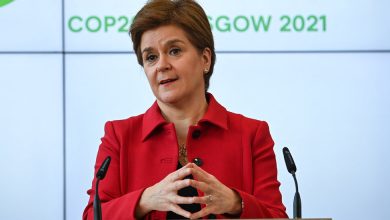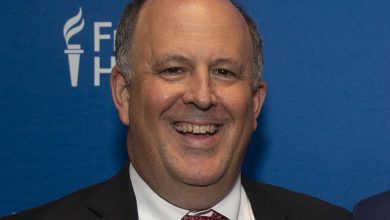British Cabinet Minister Calls for the End of the BBC License Fee

Over the weekend, a British government minister attempted to deal a death blow to the main source of funding for the BBC, a license fee charged each year to any household with a TV.
Nadine Dorries, who oversees the BBC in the cabinet, said on Twitter that an upcoming announcement about the license fee “will be the last.” She also linked to an article that said she would freeze the fee for the next two years — a move that will require substantial budget cuts at the public broadcaster because of inflation.
The BBC and the government have been in negotiations since late 2020 over the amount TV owners must pay over the next five years.
Three-quarters of the BBC’s income, about £3.75 billion ($5.1 billion), comes from the license fee, which is currently £159 (or $217) per household. The fee was introduced in 1923 to pay for radio. Now it funds eight national TV channels, 10 radio stations, local stations (including Welsh and Gaelic language services), educational content and on-demand services. Fourteen percent of the license fee funds non-BBC TV.
Ms. Dorries, who is the culture secretary, and fellow Conservatives have long argued that the BBC needs a big overhaul in how it is funded. They have also said it is too left-leaning and too London-centric.
“The days of the elderly being threatened with prison sentences and bailiffs knocking on doors, are over,” Ms. Dorries said in the tweet, on Sunday. “Time now to discuss and debate new ways of funding, supporting and selling great British content.”
The BBC’s funding through the license fee is guaranteed until the end of 2027, after which the BBC’s Royal Charter expires and its mission, public purpose, and funding method need to be renewed. New terms will be decided with the government of the day. But before then there will be another general election, which will actually determine the fate of the license fee.
The Conservative government, led by Prime Minister Boris Johnson, has not made a formal announcement about the funding for the BBC through to 2027. But Ms. Dorries shared a Daily Mail article, which said the license fee would be frozen for the next two years and could face below-inflation increases for the three years after that. For the past five years, the fee has increased in line with inflation annually.
In Britain, inflation is at its highest level in a decade, and freezing the license fee would require the broadcaster to make even more cuts.
Since 2016, the broadcaster has been undertaking a vast cost-cutting plan, trying to save £800 million annually. This fiscal year, it expects the savingsto rise above £950 million. Last year, it cut 1,200 jobs. The changes have come amid an overhaul of the BBC’s leadership. Since late 2020, a new director-general and chairman have been installed. Deborah Turness, who was president of NBC News, will be the BBC’s next director of news.
Following complaints about bias in its news coverage, the broadcaster announced last year a plan to spend an additional £700 million outside of the capital city by 2027 and relocate 400 jobs.
The broadcaster has been facing increasing pressure and not just from the government. The BBC is trying to reach a more diverse and younger audience while cutting costs, as big-budget streaming companies such as Netflix and Spotify grow their presence in Britain.



